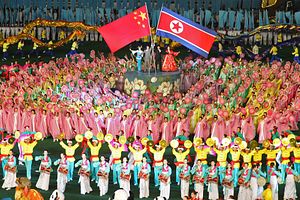North Korea’s ruling party recently called on citizens to stand up to its patron China’s “hostile schemes” in a blistering attack that invoked nuclear war with Beijing, a report has claimed.
In a document distributed to provincial committees, the Workers’ Party of Korea implored party members and workers to “soundly crush China’s pressuring schemes with the force of a nuclear storm for its betrayal of socialism,” reported The Daily NK.
The document, dated March 10, lambastes China’s decision to join sweeping U.N. sanctions against Pyongyang over its latest nuclear and rocket tests. Daily NK, a North Korea-focused news site, said it obtained the document via Sino-North Korea relations expert Lee Young Hwa, a professor at Kansai University in Osaka, Japan.
If genuine, the broadside would be a striking indication of how uneasy relations have become between Pyongyang and Beijing, whose relationship Mao Zedong famously described as being as close as “lips and teeth.”
North Korea analysts that spoke to The Diplomat, however, expressed skepticism about the document’s authenticity.
“If this document is authentic, we can look forward to a travel ban from the North Korean side against Chinese tourists, more nationalization of Chinese assets in the Democratic People’s Republic of Korea along the lines of the 2012 Xiyang fiasco (in which the mining firm reportedly lost tens of millions of dollars), preparation to lose China’s protective human rights veto at the United Nations, the possible ouster of Chinese journalists from Pyongyang, and a military build-up on the Chinese-North Korean border,” said Adam Cathcart, a lecturer at the University of Leeds. “However, since this document is likely a forgery, I don’t expect any of those things to happen.”
Another North Korea scholar, who did not want to be named but said he was familiar with the document’s acquisition, also questioned its authenticity, pointing to it being handwritten and how it reached the media.
Lee, the reported source of the document, could not be reached for comment.
Even if fake, however, the document echoes real North Korean frustration with China, said Daniel Pinkston, an international relations professor at Troy University.
“I think the underlying sentiments have been present in North Korea for a long time,” said Pinkston, who was a Korean linguist in the U.S. Air Force. “But I think the level of resentment that the North Koreans feel for the Chinese is only becoming clear to outsiders now.”
Pinkston said the countries had shared antipathy for years, despite their reputation as close allies.
“North Korea’s trade dependency gives China the opportunity to extract rents from North Korea and of course they do,” he said. “And the North Koreans know they do, and the North Koreans hate them for it. All the while Chinese look at North Korea with contempt, viewing North Korea as an anachronistic backwater that is stuck in its own North Korea-style cultural revolution.”
China is responsible for more than 70 percent of North Korea’s trade, which, analysts believe, gives it significant influence on its neighbor’s behavior. While Beijing voted for the most recent U.N. sanctions last month, it’s unclear how serious it is about applying them. Early reports have suggested that lax enforcement has allowed trade to continue largely unaffected at major border crossings such as Dandong.

































